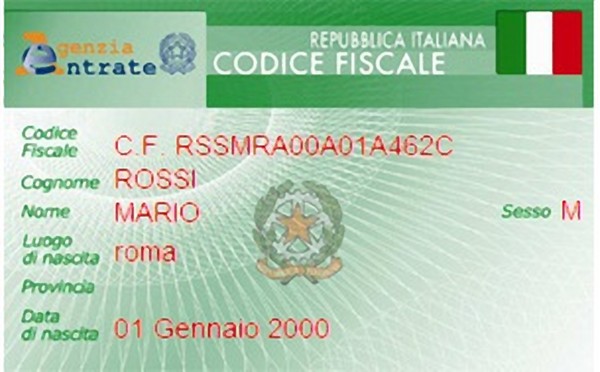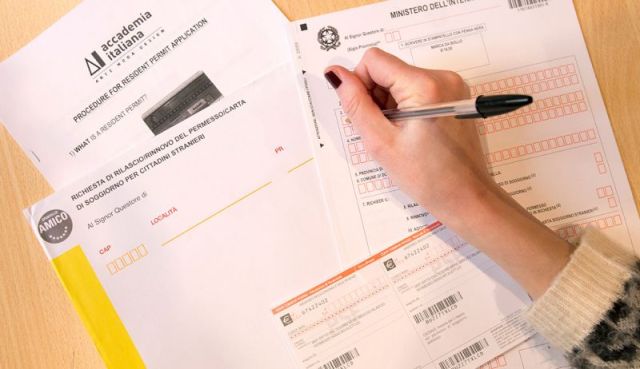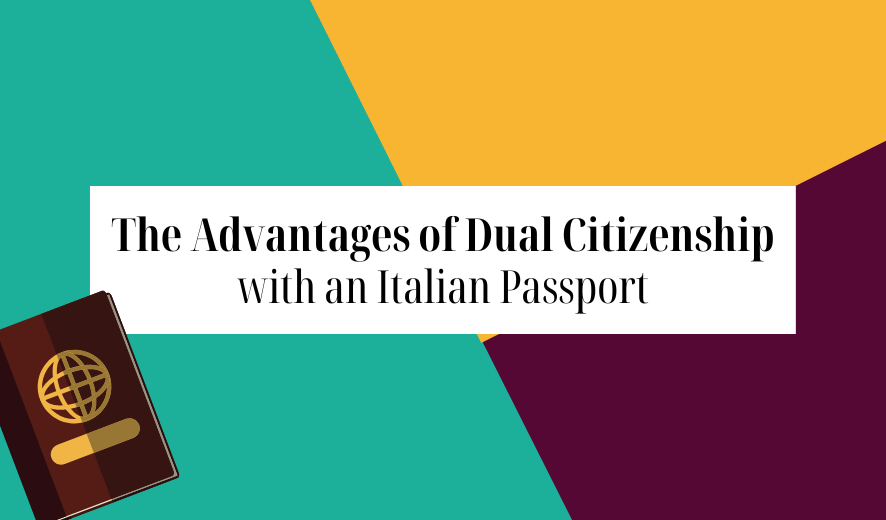Visas are issued by the Italian Embassy or Consular Sections of a foreign national’s country of residence. Permits to stay are issued in Italy by the Questura (Police Headquarters) having jurisdiction in the province where a foreign national is staying. Foreign nationals are required to apply for residence permits within 8 working days (i.e. excluding Sundays and holidays) of arrival.
Citizens of some foreign countries can visit Italy and stay for 3 months without a VISA. In some cases, citizens can stay for a longer period under a permit of stay or “permesso di soggiorno”. In most cases, foreign citizens must return to their country of origin and request a specific VISA at the corresponding Consulate. Therefore, we recommend to ask for a VISA at the Italian Consulate or Embassy of your country of origin in case you want to stay in Italy for a period longer than 3 months.
The most common types of VISA and Permit to stay are the following:
• VISA/Permit for family reunification: valid for a year from the date of issue; it is issued to the sponsoring migrant’s family members following approval of a reunification application.
• VISA/Permit for employment purposes (indefinite, fixed-time or seasonal contracts): this can only be issued after obtaining work authorization from the Sportello Unico per l’Immigrazione – SUI (Immigration Desk) at the Prefettura (central government’s territorial office). In order to enter into an employment relationship with a non-EU national residing abroad, employers, whether Italians or foreigners legally residing in Italy, are required to apply for permission to hire an individual migrant worker at the Immigration Desk in the province where the job will be carried out.
• VISA/Permit for self-employment purposes: may be applied for to conduct a non-occasional, self-employed work activity in the industrial, professional, handicraft or commercial sectors; to set up a company or partnership; to access corporate managerial positions. In order to obtain such a visa, foreign nationals must fulfil the same professional and moral requirements demanded for Italian citizens by the law with regard to the same type of activity.
• VISA/Permit for highly qualified workers: such is the case of journalists, highly specialized staff who work for a corporation domiciled in Italy, artists, dancers and musicians, etc (art. 27 Decreto Legislativo 25 luglio 1998, n. 286).
• Elective Residency Permit: the Elective Residence Visa/Permit is for those who have chosen Italy as the country of permanent residence and who are able to support themselves autonomously, without having to rely on employment while in Italy, whether as dependent employees, as self-employed employees or employees working remotely online. You cannot finance your residence in Italy through any type of work and to obtain the VISA/permit you must demonstrate that you own a property or that you have signed a lease.
Useful blogs:
Expats taxes in Italy 2021
FAQ: Italian taxation for Expats
Taxation in Italy
Tax benefits for those who transfer the fiscal residence to Italy
Useful links:
Ministry of Foreign Affairs (Italy)
Chamber of Commerce
Public administration for businesses
National Agency for Investment and Business Development
Directory of companies in Italy
Don’t forget to check out our Social Media accounts and subscribe to our Newsletter so you can be updated with information customized for people that want to move, live and love Italy!
FAQs for Italian citizenship by Marriage (2023)
Understanding the Tessera Sanitaria: Your Italian Health Insurance Card
Non-Married Partners: How to Obtain a Residence Permit in Italy as De Facto Cohabitants
How to get tax identification number for foreign citizens (Codice Fiscale)
How to register in Italy as a EU citizen
Mastering Public Transport in Italy
The Advantages of Dual Citizenship with an Italian Passport: Unlocking Boundless Opportunities
What you need to know about Visas and Permits to stay in Italy
If you’re considering a move to Italy, you’re not alone. The country’s beautiful landscapes, rich culture, and delicious cuisine are just a few of the reasons why expats are drawn to Italy. However, moving to a new country can be a daunting process, and Italy is no exception. In this article, we’ll take a look at the pros and cons of moving to Italy, provide legal advice for expats, and discuss what you can expect from the Italian bureaucracy and processes.
Pros of Moving to Italy
Beautiful Scenery
From the rolling hills of Tuscany to the stunning coastlines of the Amalfi Coast, Italy’s natural beauty is hard to beat.
Rich Culture
Italy is famous for its art, music, fashion, and cuisine. As an expat, you’ll have the opportunity to immerse yourself in this rich culture and learn new skills and perspectives.
Food and Wine
Italy is a food lover’s paradise, with delicious pasta, pizza, gelato, and wine. As an expat, you’ll have access to some of the best food and wine in the world.
Quality of Life
Italy is known for its relaxed lifestyle, with plenty of opportunities for leisurely strolls, coffee breaks, and long dinners with friends.
Cons of Moving to Italy

Bureaucracy
The Italian bureaucracy can be slow and frustrating, and navigating the complex systems and processes can be challenging for expats – But the good thing is that you know us and we could help you get through the worst part of this with our Legal team!
Language Barrier
Although many Italians speak English, the language barrier can still be a hurdle for expats, particularly in more rural areas.
Cost of Living
Italy can be an expensive country to live in compared to others, particularly in major touristic cities like Rome and Milan. You can check online the cost of certain things in websites like Numbeo.
Unemployment
Italy has a relatively high unemployment rate, particularly among young people. Finding work as an expat can be difficult, particularly if you don’t speak Italian. Good thing you can check on our Facebook Group or Newsletter for any open position!
Legal Advice for Expats Coming to Italy
If you’re planning to move to Italy, it’s important to be aware of the legal requirements and processes involved. Here are some tips to help you get started:
• Obtain a Visa: Depending on your nationality and the purpose of your stay, you may need to obtain a visa before you can enter Italy. The Italian embassy or consulate in your home country can provide more information.
• Register with the Local Authorities: Once you arrive in Italy, you’ll need to register with the local authorities within eight days. This process is called the “residenza” and involves obtaining a codice fiscale (tax code) and registering your address with the local police.
• Obtain a Permesso di Soggiorno: If you plan to stay in Italy for more than three months, you’ll need to obtain a permesso di soggiorno (residence permit). This process can be complex and time-consuming, so it’s a good idea to seek legal advice.
• Understand Your Tax Obligations: If you’re working in Italy or earning income from Italian sources, you’ll need to pay taxes in Italy. It’s important to understand your tax obligations and seek advice from a professional if necessary.
Italian Bureaucracy and Processes
As mentioned earlier, the Italian bureaucracy can be slow and frustrating. Here are some tips to help you navigate the process:
• Be Patient: The Italian bureaucracy is known for its slow pace, so it’s important to be patient and persistent.
• Seek Help: If you’re struggling with the bureaucracy, don’t be afraid to seek help from a professional or a local Italian friend. Or you can also contact us and our legal team can give you a free call to discuss your situation! Email us at legal@expatslivinginrome.com
If you want to receive more information about this topic, make sure you subscribe to our Newsletter and don’t miss out on anything! We are here to help you feel at home.

Family Reunification through Legal Services
Family reunification holds a significant place in Italian society, recognizing the importance of maintaining strong family ties. As families face separation due to migration, conflicts, or other circumstances, the legal process of family reunification becomes a crucial avenue to bring them back together. In this blog, we will explore the legal services available in Italy […]

Elective Visas in Italy: A Gateway to Living La Dolce Vita
For individuals seeking to experience the dolce vita in Italy, the elective visa provides an opportunity to make that dream a reality. The elective visa is designed for individuals who have the means and desire to reside in Italy without engaging in any employment or business activities. It caters to retirees, independent professionals, and individuals […]

How to get tax identification number for foreign citizens (Codice Fiscale)
The codice fiscale is the Italian tax code which you are required to get, whether you’ll be working or not, the code is essential in Italy. You’ll need it to do many things like opening a bank account to renting or buying property. You can get a codice fiscale at the Italian consultate office or embassy […]

How to register in Italy as a EU citizen
If you are planning to live in Italy permanently this blog will help you understand how to register as EU citizen. First you need an Italian Tax Identification Number (Codice Fiscale) if you are NOT in Italy you must apply at the Italian Consulate. If you are in Italy you can apply online agenziaentrate.gov.it With the […]

The Advantages of Dual Citizenship with an Italian Passport: Unlocking Boundless Opportunities
Having dual citizenship and an Italian passport can offer several advantages: 🌍 Freedom of movement: With an Italian passport, you can enjoy the freedom to travel and reside within the European Union (EU) and the Schengen Area without any visa requirements. This allows you to easily explore and work in multiple countries within these regions. […]
Previously, Legal help for Expats published this post on how to acquire Italian citizenship. If you’ve read it and realized that CITIZENSHIP AS A RESULT OF ITALIAN PARENTS/ANCESTORS (“ius sanguinis”) is your case, then here are the complete instruction on how to proceed:
The procedure to apply for jure sanguinis citizenship can be carried out at the Italian Consulate in a foreign country where the applicant resides, or in Italy.
(Art. 1, Law No. 91/1992)
If the citizenship application process is filed in Italy, you might need to move to Italy for the duration of the procedure (in order to be available in case public administration requires it; you can process it or delegate the process)
Immediately after your arrival in Italy, you must declare your presence in the country (“dichiarazione di presenza”) at the Municipality where the procedure will be carried out indicating your residence address. Then you must appear in person before the “Prefettura” with appointment to get your paperwork checked.
Duration of citizenship recognition under administrative law is not predictable at all, since 2018 the Italian Government has established that Public Administration has 4 years to decide on said requests.
The procedure
To apply for jure sanguinis citizenship the applicant must show that he/she has an Italian ascendant and that the citizenship chain has not been interrupted or lost.
You must gather all the required documentation: birth, marriage and death certificates of all ascendants in the same line of kinship up to the applicant applying for citizenship; certificate stating “the absence of loss of Italian citizenship” by the Italian ascendant (e.g.: a letter from a State Public Department such as an Electoral Office or the National Naturalization Record stating that the ascendant never acquired citizenship in any other Country to which he/she emigrated, i.e. and did not lose or renounce Italian citizenship.
The Electoral Office shall certify, that the person never appeared on voting list). Otherwise, if the Italian ascendant has lost or renounce citizenship their Italian citizenship, the applicant must present certificates showing that citizenship was lost after the descendant’s birth, who has acquired the right to citizenship and continues with the citizenship chain.
Example of the right chain of transmission:
- marriage of ascendant A with B
- birth of ascendant C (son of A + B)
- death of ascendant A
- marriage of ascendant C with D
- birth of ascendant E (son of C + D)
- death of ascendant C
- marriage of ascendant E with F
- etc. ... following the chain up to the applicant for citizenship (you)
Each descendant must have been born before the death of his or her direct ascendant.
It does not matter if at any point in his/her life that ascendant A (only Italian citizen of the chain) has lost citizenship, what does matter is that his/her child (C) was born before they lost their citizenship of A.
All certificates issued by foreign Authorities must be legalized and translated by a sworn translator. Legalization is an administrative procedure by which validity is granted to a foreign official document, verifying the authenticity of the signature and the capacity of the signing authority (e.g.: in the case of the UK, USA, Spain or Argentina a document is legalized by apostille). This means that certificates must be legalized only in case they are issued by Official Organizations.
A common question is “does the Apostille expire?”
The Apostille does not have an expiration date, and valid as long as the document is still valid. Birth, marriage or death certificates issued in Argentina and in Italy that are legalized, authorized and apostilled have no expiration date; certificates issued in Spain are valid for three months. Therefore, we suggest that you check with the registry of your own country, or even better, in the city or town where the citizenship process is carried out to avoid expired documentation. Which can delay your process.
Old certificates often present many errors (typos, names do not match, birth dates are not correct, etc.). As a result, doubts could arise about the identity of the person in question. In such cases you can request the corresponding Official Department to rectify the document or to issue a certificate stating that the identity of one person indicated in two different documents is the same.
The “1948” case
In the case of jure sanguinis citizenship by female ascendant, when one of the ascendants is a woman and her descendant was born before 1948, a trial must be initiated before the court with jurisdiction in Rome in order to carry out the necessary procedures.
In common language this is known as the “1948” case.
In 1948 the Italian Constitution established the principle of equal rights between men and women. As there are still legal gaps in some areas of the Italian legal system (including citizenship), a judge’s ruling is necessary for the Court to recognize citizenship.
The duration of the trial can last from 1 to 3 years.
A power of attorney is required to start the trial
In order to avoid any dispute that may delay and/or block a trial, when the applicant can’t sign the power of attorney in person before the lawyer in Italy, we recommend the issuance of a public deed. However, power to act can be granted by private instrument certified by a notary public. In this second case, as established by the Italian Supreme Court of Appeals (rulings nº 22559 of November 4, 2015; nº 12309 of May 25, 2007; n. Of May 5, 2006, etc.), the following is essential:
1) the power of attorney must be signed in the presence of a notary public;
2) the Notary public must have verified the identity of the parties;
3) points 1) and 2) must arise from the declaration of the notary public attached to the deed.
Minors must be represented by the child’s parent or legal guardian. You should check with the notary public in your country which formalities must be fulfilled in such a case.
FAQ:
– When in the same family line there are several descendants interested in obtaining citizenship, one single process (parental trial) can be initiated. Legal representation shall be collective and simultaneous and, as a result, costs shall be reduced.
– The procedure can be followed using the smartphone app “Giustizia Civile”. The app allows checking all the ever-changing circumstances of the trial – except for the name of the parties and the lawyer due to privacy reasons.
– According to Italian law, a child under 18 years old who has already acquired citizenship automatically acquires citizenship if he/she lives permanently with the parent who has already acquired citizenship, even outside Italy (art. 14 law n. 91 / 1992). Proof of cohabitation must be presented together with the necessary documentation (for example, residence certificates).
ITALIAN CITIZENSHIP CAN BE ACQUIRED IN ONE OF THE FOLLOWING WAYS (Law No. 91/1992):
1) CITIZENSHIP AS A RESULT OF ITALIAN PARENTS/ANCESTORS (“ius sanguinis”)
A person acquires Italian citizenship when born the father, or mother are Italian citizens or whose ancestors (there are no limits of generations) are Italian citizens. Hence the principle of ius sanguinis – already enshrined in the previous legislation – is reaffirmed as a key principle for the acquisition of citizenship, while the ius soli remains an exceptional and residual case. Read more
2) CITIZENSHIP GRANTED TO PERSONS BORN ON ITALIAN SOIL (“ius soli”)
Italian citizenship is granted to:
- the children of unknown parentage found abandoned on Italian soil, whose citizenship is impossible to ascertain.
3) ACQUISITION OF CITIZENSHIP WHEN MINORS
Law attaches particular importance to the acquisition of citizenship when minors as a result of:
- adoption;
- parent’ s naturalization (the minor children of those who acquire or reacquire Italian citizenship, when living together with them, shall acquire Italian citizenship, but, after coming of legal age, they can renounce it, if in possession of other citizenship).
4) ACQUISITION BY CLAIM (article 4 of Law No. 91/92) - A person who is born in Italy and has resided legally in Italy without interruption until the age of 18 can become an Italian citizen upon request before the age of 19. 5) CITIZENSHIP BY MARRIAGE TO AN ITALIAN CITIZEN OR BY CIVIL PARTNERSHIP The foreign spouse can acquire Italian citizenship upon request, if the following requirements are met: - abroad: three years after marriage. These terms are halved, for example, if the subjects have children. 6) ACQUISITION BY RESIDENCE As a general rule, for non-EU foreigners, legal residence on the territory of the Italian State for at least 10 years is required, but there are many cases for which the period of residence required is lower: - 4 years for the citizen of an EU Member State; - 5 years of legal residence following adoption for the foreigners of legal age, or following the recognition of status for stateless people or political refugees. 7) GRANTING OF ITALIAN CITIZENSHIP PURSUANT TO SPECIAL MERITS To foreigners who rendered eminent services to Italy, or when there is an exceptional interest of the State. The starting of the procedure does not require an initiative of the subject concerned, but requires a proposal made by bodies, organizations, public personalities, associations, etc. proving a thorough assessment of the existence of the requirements established by law. 8) GRANTING OF ITALIAN CITIZENSHIP PURSUANT TO SPECIAL LAWS (Law No. 379 of December 14, 2000) The declaration designed to obtain Italian citizenship for the persons born and formerly living in the territories of the former Austro-Hungarian Empire and their descendants, pursuant to Law 379/2000, could be made by December 20, 2010 to the Italian consular authorities, if the applicant was living abroad, or to the Civil Status Registrar of the Municipality, if the applicant was living in Italy. This article contains useful information for British citizens in Italy in the case of a no-deal Brexit) EU legislation states that EU citizens have the right to reside on the territory of another EU country for up to three months without any conditions other than the requirement to hold a valid identity card or passport. Once the UK decided to leave the EU, it has been established that English citizens who have been resident in Italy for less than three months can apply for legal residence (attestazione di residenza) by 31 st October and in case of a no-deal Brexit they will have the right to permanently stay in Italy as it was before the Brexit. To apply for the residency by the Municipality of Rome you must fulfil the standard application form that you can find on the municipality website. Basic requirements are as follow: 1) Evidence or affidavit the applicant have financial resources (about 5.500 euros per person – amounts vary year after year); Bare in mind that, if the Municipality won’t allow you to apply before 31 st October, it’s better if you keep any evidence that shows that you were in the country on 31 st October and intending to stay (not just a tourist visit): evidence of your request (email, “raccomandata con ricevuta di ritorno”, protocol number of the request, etc.), evidence of your arrival (flight tickets, passport stamp, etc.), evidence of your rental contract or property purchase or even hotel stay, Italian bank account showing payments in and out (for eg. utility bills if appropriate).
2) Health Insurance (minimum duration one year);
3) Copy of a valid Passport;
4) Accommodation: if you own the place where you live in Italy, you must attach a copy of the property title; otherwise, you must give evidence of a registered lease agreement or any other accommodation arrangement (for example, letter of hospitality by the landlord, a relative or a friend);
5) Marriage certificate (only if you are applying with your spouse, both being EU citizens);
6) Birth certificate (if you apply with your children)
7) Certificate of civil status evidencing you are single
